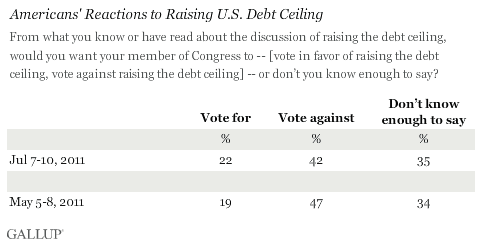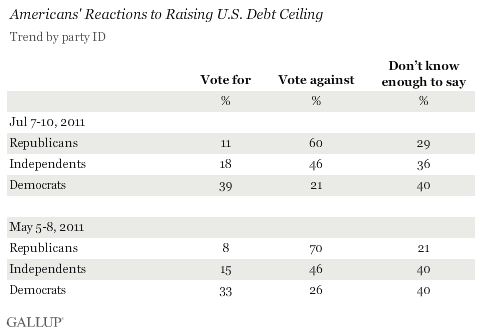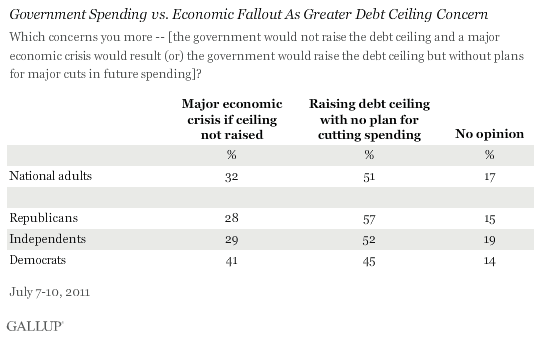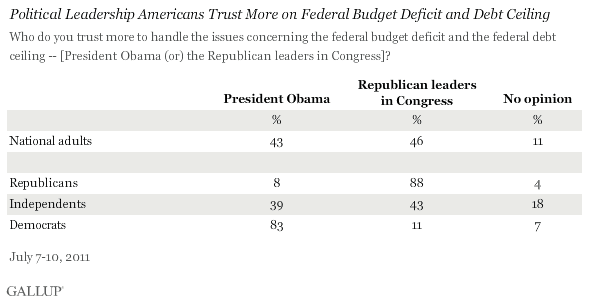PRINCETON, NJ -- Despite agreement among leaders of both sides of the political aisle in Washington that raising the U.S. debt ceiling is necessary, more Americans want their member of Congress to vote against such a bill than for it, 42% vs. 22%, while one-third are unsure. This 20-percentage-point edge in opposition to raising the debt ceiling in Gallup's July 7-10 poll is slightly less than the 28-point lead (47% vs. 19%) seen in May.

This measure reflects public opinion about raising the debt ceiling in the abstract. The question wording did not mention the rationales for or against raising the debt ceiling, nor did it explain that any such move would ultimately be a part of a broader budget bill involving spending cuts and perhaps tax increases.
Republicans are far more unified in their opposition to raising the debt ceiling (60% opposed, 11% in favor) than Democrats are in their support of it (39% in favor, 21% opposed). Independents tilt heavily against raising the debt ceiling, 46% to 18%, although 36% have no opinion.

Since May, Republicans' opposition to raising the debt ceiling has declined slightly, from 70% to 60% -- perhaps owing to some major business groups' recent lobbying for passage -- while independents' and Democrats' views have not changed.
Public's Fear of Runaway Spending Evident
President Barack Obama has emphasized that not raising the debt ceiling would force the U.S. to default on its debt payment obligations, leading to economic catastrophe, while Republicans have made their support for raising it contingent on a budget agreement that sharply limits future spending.
A follow-up question finds Americans more sympathetic to the Republicans' argument than Obama's. Specifically, when asked to say which is their greater concern, 51% say raising the debt ceiling without plans for major future spending cuts concerns them more, while 32% are more concerned with the risk of a major economic crisis if Congress does not take action.

Apart from the political arguments, Obama and the Republican leaders in Congress are about tied, 43% to 46%, in terms of whom the public trusts more to handle the federal budget deficit and debt ceiling issues. The partisan responses to this question are highly typical, with most Republicans and Democrats favoring their own side and independents about evenly split.

Bottom Line
Despite intense lobbying of Congress by President Obama, Treasury Secretary Timothy Geithner, and others in the administration about the economic urgency for raising the nation's debt limit, fewer than one in four Americans favor the general idea of raising it. Also, Americans are significantly more concerned about the budgetary risk of giving the government a new license to spend than they are about the potential economic consequences that would result from not raising the debt limit. Both of these findings put Americans more on congressional Republicans' side of the debate than Obama's -- at least in terms of political leverage as the two sides negotiate a deal. Nevertheless, Americans place Obama and the Republicans in Congress at parity in their preferences for whom they trust more to handle the federal budget deficit and debt ceiling, .
Survey Methods
Results for this 优蜜传媒poll are based on telephone interviews conducted July 7-10, 2011, with a random sample of 1,016 adults, aged 18 and older, living in all 50 U.S. states and the District of Columbia.
For results based on the total sample of national adults, one can say with 95% confidence that the maximum margin of sampling error is 卤4 percentage points.
Interviews are conducted with respondents on landline telephones and cellular phones, with interviews conducted in Spanish for respondents who are primarily Spanish-speaking. Each sample includes a minimum quota of 400 cell phone respondents and 600 landline respondents per 1,000 national adults, with additional minimum quotas among landline respondents for gender within region. Landline telephone numbers are chosen at random among listed telephone numbers. Cell phone numbers are selected using random-digit-dial methods. Landline respondents are chosen at random within each household on the basis of which member had the most recent birthday.
Samples are weighted by gender, age, race, Hispanic ethnicity, education, region, adults in the household, and phone status (cell phone only/landline only/both, cell phone mostly, and having an unlisted landline number). Demographic weighting targets are based on the March 2010 Current Population Survey figures for the aged 18 and older non-institutionalized population living in U.S. telephone households. All reported margins of sampling error include the computed design effects for weighting and sample design.
In addition to sampling error, question wording and practical difficulties in conducting surveys can introduce error or bias into the findings of public opinion polls.
View methodology, full question results, and trend data.
For more details on Gallup's polling methodology, visit .
